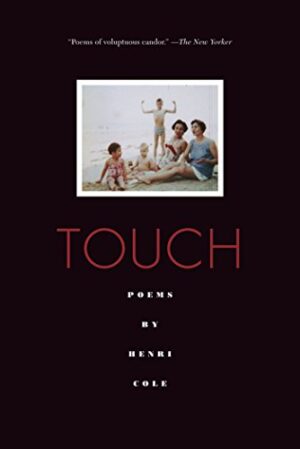Touch
by Henri Cole
reviewed by Jeremy Bass
“Awful things have their own kind of beauty,” Henri Cole writes in “Cherry Blossom Storm,” and his eighth book of poetry bears testament to that statement. Like much of Cole’s recent work, Touch explores the realm where the spiritual and the domestic intertwine. As in his preceding collections Middle Earth and Blackbird and Wolf, Touch is comprised almost exclusively of unrhymed sonnets, a form Cole harnesses for its brevity and compression. Whether addressing his mother’s death, a failed relationship, or a diverse array of images from the outside world, Cole’s new book continues to pursue fundamental questions: “What is this earth? What is this planet or this body in which I live?”
In Cole’s work, beauty is always juxtaposed with pain, the sensual with the morbid, humorous with the divine. A dead body can seem “symbolic, like the hot-water bottle,” or be “changed into hallowed marble.” A pig balancing on the back of a pickup truck one moment represents “bacon now tipping into split pea soup,” and the next “a man in his middle years struggling to remain vital and honest while we’re all just floating around accidental-like on a breeze.” Such doublings have the corresponding effect of transforming relatively short poems into expansive worlds, each luminous and strange.
Touch is that rare book of poetry that actually reads like a book, its three sections carefully arranged by theme, each individual poem leading seamlessly into the next. At the core of Touch is the death of the poet’s mother, the title poem itself written from the mother’s point of view as her dead body is lowered into the grave: “In a hospital morgue, I lay in a pine box . . . On a hillside, they lowered me with ropes into rock.” The book’s final section documents the end of a relationship torn apart by manipulation and drug addiction: “the whole insane, undignified attempt at loving him is over.” As in all of his work, Cole describes these difficult episodes with unflinching directness. Such a strategy might come off as oppressive, but instead it succeeds in placing these experiences within the larger context of human existence. The book’s middle section addresses a myriad of subjects: animals and friends co-exist alongside suicides and paintings; war, capital punishment and history intermingle with breakfast, newspapers and dreams. These poems effectively span the gulf between death and love, while self-discovery waits in the wings: “Earth was drawing me into existence,” the child-poet says early in the first section, while in one of the book’s final poems an adult speaker affirms, “the world has just come into existence.”
Cole has consistently set himself at odds with popular, elliptical trends in contemporary poetry, favoring what he has called “the truth-telling function of the lyric” to poems more concerned with verbal athleticism and surface detail. As a means to this end, Cole has somewhat curiously trimmed more and more away from his poems, leaving a surface that feels factual at times, almost cold. Yet these poems remain fierce creations, vibrant testaments to language and to life. Touch affirms “the idea of beauty as a salve and of aesthetics making something difficult accessible,” while preserving the sense of openness and risk that is its fundamental drive. “There’s something unsettling happening,” as Cole says in “Hairy Spider,” “but it tests the connections between everything.”
Published on May 16, 2013

